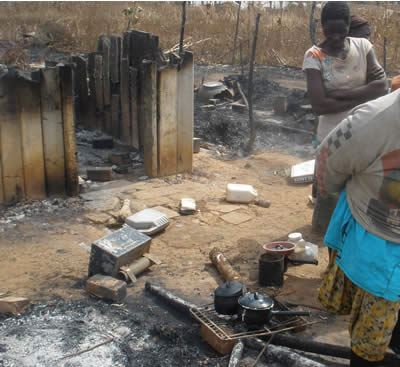Borrowdale settlement razed
Thursday, August 26th, 2010 by Amanda Atwood
Photo Credit: Zimbabwe Lawyers for Human Rights
Last week, a friend and I went on a run that took us half way around the Borrowdale Race Course. The route reminded me about Natasha’s blog about the community living around the track, and their opinion of horse-piping.
The community was still there as we went past. As Natasha wrote, the contrast between the grass and cardboard shacks this community lives in – exposed in the vlei in desperate conditions – and the enormous mansions of Gun Hill and Borrowdale which surround them is sobering and disturbing. But still, this was home for the people who lived there. Or it was until police raided the settlement and burnt it in a midnight raid yesterday, according to this statement from Zimbabwe Lawyers for Human Rights:
Police blatantly violate the right to shelter in raid and burning of Borrowdale settlement
Zimbabwe Lawyers for Human Rights (ZLHR), is greatly shocked at the unbecoming conduct of identified members of the Zimbabwe Republic Police (ZRP) who at about 00:30 hours on 25 August 2010 raided and destroyed an informal settlement at Borrowdale Race Course in Harare.
At least thirty police officers, easily identifiable due to their police uniforms believed to be stationed at Harare Central Police Station and the nearby Highlands Police Station proceeded to order the settlers to remove their possessions from the shacks and go and built homes in their rural areas. After 10 minutes elapsed, the ZRP members, some of whom were armed, and also accompanied by police dogs, ordered all the settlers to embark into the police vehicle and proceeded to torch at least a hundred shacks. This was done despite the fact that some of the settlers had not managed to remove their possessions. The settlers were then detained in the cold weather until the early hours of the morning when they were taken to Harare Central Police Station.
Most of the settlers whose shacks were torched down are victims of Operation Murambatsvina and some of them are employees of the Borrowdale Race Course. They moved to the settlement after being rendered homeless when their houses were destroyed under the widely condemned clean-up campaign while some of them started to reside at this settlement in 2000. From time to time the police were said to have raided the said settlement, arrested the settlers on the pretext of hunting down thieves and eventually releasing them without any charges being leveled against them.
ZLHR lawyers attended to Harare Central Police Station to assist the detained settlers who were not easily locatable due to the fact that the police have not made any entries in their detention book. ZLHR lawyers, managed to locate the 55 settlers who include 5 minor children at 13:30 hours. Lawyers have since been denied access to the settlers by the Criminal Investigation Department section represented by one Superintendent Muchengwa who advised lawyers that the clients will be allowed legal representation once they have been formally charged.
ZLHR condemns the unlawful and unprocedural actions taken by the police. Evicting and burning down the settlers’ houses without adequate notice and without providing alternative accommodation and the arbitrary deprivation of property that ensued following the illegal torching of the shacks is a violation of their right to shelter and to family life, which are guaranteed under the African Charter on Human and Peoples’ Rights, to which Zimbabwe is a voluntary State Party.
It is also disheartening that the police chose to carry out such a vindictive action against the settlers during this cold spell when they don’t have any powers to evict people. Only the messenger of court or Deputy Sheriff can carry out evictions on the strength of a valid court order which does not exist in the case at hand. Further, it is also sad to note that these arbitrary illegal actions were carried out after the Mayor of Harare had written a letter to residents assuring them that all informal settlers will not be evicted unless alternative accommodation is secured.
No lessons have been learned from the failures and illegalities of Operation Murambatsvina, and the state – through the City Council and the Ministries concerned are urged to bring to an end such illegalities and attend to issues of lack of adequate housing in a lawful and orderly manner.
ZLHR, urges the police to carry out investigations into this illegal conduct that is tantamount to arson as defined in the Criminal Law (Codification and Reform) Act and bring those accountable for these inhumane acts to justice.
ZLHR, further wishes to remind the police to be mindful of the right of all accused persons to legal representation of their choice, and the right to be informed of any criminal charges upon arrest.
ZLHR calls upon all state actors to desist from violating the economic and social rights of innocent citizens but to work towards the progressive realization of these rights as in accordance with Zimbabwe’s human rights obligations.









